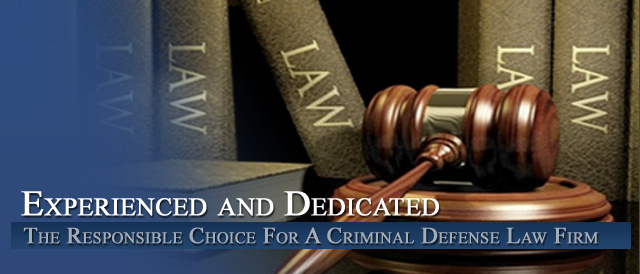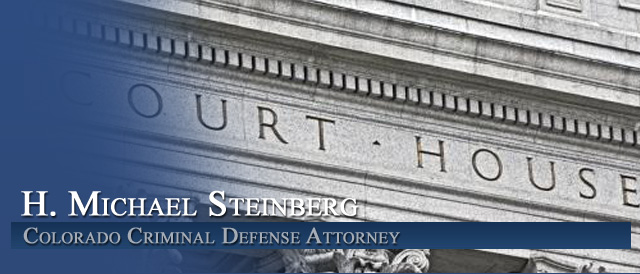




Colorado Criminal Juvenile Law – Sealing Expunging Colorado Juvenile Records
Colorado Criminal Lawyer for Sealing – Expunging Juvenile Criminal Records
Understanding the reasons for juvenile criminal records – and why – over time they are less important and should be removed so that our children can grow up in a world that does not hold their childhood mistakes against them for the rest of their lives.
Juvenile court, law enforcement and probation records exist for important reasons. They are used for community protection—to track patterns of criminal behavior and to provide for appropriate levels of supervision and treatment. The utility of juvenile records diminishes over time and in relation to the severity of juvenile offending.
Indeed, when records become an obstacle to a youth’s ability to become a productive member of mainstream society, those records reduce community protection and undermine important societal goals. This guide shows how juvenile defenders can give their clients room to reform by a employing thoughtful approach to expunging juvenile records.
|
Records of juvenile crime can follow an individual through his or her adulthood |
They can have far-reaching consequences on the individual’s ability to join the military, pursue higher education, or obtain employment. Many people have the false impression that juvenile offenses are immediately erased from one’s record at the age of majority.
Too many people also equate juvenile misbehavior with adult criminal behavior—they fail to appreciate that adolescence is a volatile stage of life through which the vast majority of teens pass without additional contact with the law. Unfortunately, even though adolescents are generally less culpable and more capable of change than adults, their records can be just as damaging to them later in life as records caused by adult criminal behavior.
One method of assuring these records are not harmful to youth is through expungement.
In subsequent judicial matters prior juvenile court involvement may be admissible in judicial proceedings.
First, for presentence investigation and reports following an adjudication of delinquency, records may be used in dispositional proceedings after an adjudication of delinquency. For this purpose, records are integral to assuring that the child receives an appropriate placement for his or her needs.
Second, prior juvenile adjudications may be admitted in hearings involving subsequent juvenile charges. Third, juvenile adjudication records may be used in civil proceedings where the juvenile has put his reputation or character at issue, and in criminal proceedings if the juvenile was adjudicated delinquent for an offense, and the evidence of which would be admissible if committed by an adult.
Finally, prior juvenile adjudications may be used in adult criminal proceedings to enhance the sentence based upon prior juvenile felonious conduct
Employment
If an employment application asks whether the applicant was ever convicted of a felony or misdemeanor, a juvenile whose record includes an adjudication of delinquency need not respond in the affirmative.
Attorneys for youth who are adjudicated should instruct their clients that they have no legal obligation to answer affirmatively when asked this question on an employment application. A juvenile adjudication is not synonymous with a criminal conviction, and therefore it is not dishonest to say that the applicant was never convicted of a felony or misdemeanor.
However, if the application clearly asks whether the person has ever been adjudicated delinquent, and the individual’s record has not been expunged, s/he must respond in the affirmative.
Financial Aid
Certain drug offenses may make an individual ineligible for federal financial aid. This is generally for a specified duration dependent upon whether the offense was a first offense or a subsequent offense.
Suggestion:
Attorneys for youth should counsel their clients on the impact a record may have on their future success. Equally important, however, is their relationship with a potential employer. Even though they may have no legal obligation to disclose a juvenile record, I usually counsels clients to do so.
That is because some employers are usually forgiving when they learn directly from the individual that they were charged as a child for an act; they may be less forgiving if the information is disclosed through a background check. However, if youth are unsure of how an employer may respond, they may want to order a record check prior to beginning an employment search to discover for themselves what an employer would find in a background check.
Military Service
If a juvenile, upon reaching the age of majority, or at age 17 with parental consent, chooses to enter the military, s/he may have difficulty gaining entrance if s/he has a juvenile record. Although court records are only accessible to military officials via a court order, law enforcement records maintained are always accessible to military officials. Although each branch of the military has separate regulations regarding the use of juvenile and criminal records, none specifically excludes the recruiters’ use of the juvenile or criminal history information in the determination of whether to allow enrollment.
To be eligible for enlistment in the U.S. Army, a person must satisfy the moral criteria, which include an examination of the applicant’s civil, juvenile, and criminal history. When an applicant interviews with a recruiter, the recruiter will interview the applicant on “any records of arrest, charges, juvenile court adjudications, traffic violations, probation periods, dismissed or pending charges or convictions, including those which have been expunged or sealed.”An applicant may request a moral waiver to enlist into the Army when s/he has an “adverse disposition” as a juvenile or adult or when criminal charges resulting in conviction or action by a court amount to a finding of guilt.
However, if the applicant was convicted of certain enumerated offenses, identified by the Army regulations (not state law), s/he may be ineligible to even request a waiver. Waivers are not required for charges that were never filed, or that were dropped or dismissed. A juvenile’s attorney can aid the individual in completing The request for a waiver and the application for waiver. When an applicant requests a moral waiver, the military will seek information from law enforcement, courts, employers, and institutions using standardized forms. The applicant must also write a detailed description of all offenses and include that with the waiver request. The Air Force, Navy, and Marine Corps have similar waiver request processes by which applicants with adverse adjudications or dispositions may request enlistment.
Military recruiters will specifically ask about any records of arrest, charges, juvenile court adjudications, traffic violations, probation periods, and dismissed or pending charges or convictions including those which have been expunged or sealed.
Public Benefits
Adjudications for certain types of drug-related crimes can result in a lifetime ban on Temporary Assistance for Needy Families (TANF) and Food Stamps. For example, adjudications for offenses that would be considered felony drug convictions if committed by an adult will prohibit the individual from ever receiving federal public benefits.
Child Welfare System
A juvenile record may preclude an individual from retaining custody of his/her minor child if the court finds that the return of the child to the parent is not best suited for the child’s safety, protection, physical, mental, and moral welfare. Certain types of adjudications may also preclude an individual from approval as a foster or adoptive parent or from having a job that requires working with children.
Possession or Purchase of a Firearm
To be eligible to purchase or possess a firearm in Colorado, prior criminal and juvenile records are key considerations.
In appropriate situations, juvenile defenders can advocate for their clients by having them plead to lesser offenses so that the degree of conviction is not as great and therefore will not have such a lasting implication for the individual’s future.
Expunging versus Sealing a Juvenile Record In Colorado – They Really Mean The Same Thing
Although the terms are often used interchangeably, there is a difference between sealing and expunging a juvenile record. If a record is sealed, the public has no access to it. Sealed records, however, are available to certain individuals – including law enforcement and government authorities. There are circumstances when a juvenile court records can made available for public inspection, and similar circumstances when juvenile law enforcement records are open to public inspection. If none of those circumstances exists, the record remains sealed. When a record is expunged, it is completely destroyed. Court records and law enforcement records that are expunged must be erased from the system.
Colorado – unfortunately – uses the terms interchangeably and juvenile records are only “sealed” not expunged.
Instructions to File an Expungement JD Juvenile Case Or CR Criminal Case
General Information
Under the Colorado Children¡|s Code, a person may request their juvenile record to be expunged (sealed from public access) by filing a Petition for Expungement of Records in each case in the District Court (or Denver Juvenile Court, if appropriate).
A Petition may be filed to expunge a record only once during any 12-month period.
If a Juvenile was charged by a direct filing in the District Court as an Adult, but he/she was sentenced as a Juvenile, a Petition for Expungement of Records can be filed in the District Court criminal (CR) case.
You are eligible to Petition for an expungement order:
1. Immediately, if you were found not guilty at trial.
2. After one year, if you were given a ticket or were arrested, but no further action was taken; or you completed a juvenile diversion program or informal adjustment.
3. After four years, if the Court has terminated jurisdiction; or you were unconditionally released from commitment to the department of human services; or you were unconditionally released from parole supervision.
4. After ten years, if you have been adjudicated a repeat or mandatory juvenile offender, and the Court has terminated jurisdiction or you are unconditionally released from parole supervision, whichever date is later.
You are not eligible to Petition for an expungement order if:
1. You were adjudicated for an offense involving unlawful sexual behavior as defined in Section 16-22-102(9), C.R.S.; or
2. You were adjudicated an aggravated juvenile offender; or
3. You were adjudicated a violent juvenile offender; or
4. You were adjudicated for an offense that would be a crime of violence if committed by an adult; or
5. You were charged by the direct filing of an indictment or information in district court as a juvenile and you received an adult sentence.
Juvenile records remain accessible even if the case is closed, or dismissed, unless the Court has signed an Order of Expungement of Juvenile Records. This Order directs the Court to expunge your record, which means that you, the agency and the Court may properly indicate that no record exists.
If your case is ordered expunged, basic information identifying you and a list of any state and local agencies and officials having contact with you, will be available to a district attorney, local law enforcement agency, and the department of human services. In addition, your record will be available to any judge or probation department for use in any future juvenile or adult sentencing hearing.
For additional information, please review Colorado Revised Statute Section 19-1-306, C.R.S.
Petition for Expungement of Records (JDF 302). Here is the link to the form:
Enter the Juvenile’s name in the case caption.
All applicable sections must be completed before the Petition is filed.
This Petition must be signed in the presence of a Court Clerk or Notary Public.
Notice of Hearing on Petition for Expungement (JDF 303). Here is a link to the form:
Complete all portions of the form.
The Court will send this notice and a copy of the Petition to you and all the required agencies you listed on the Petition.
The Court may require you to provide self-addressed stamped envelopes for all the required agencies. Check with the Court regarding their requirements.
Order of Expungement of Records (JDF 304) Here is the link to the form:
Complete all portions of the form.
Complete section number 1 on the Order. This information should agree to the information you listed on the Petition.
The Judge or Magistrate will sign the Order at the time of the hearing if your Petition is approved.
Step 2: You are ready to file the case with the Court.
Provide the Court with the documents completed as described in Steps 1 above. If you are requesting to expunge multiple cases, you must file a separate Petition for each case. If the Petition has not been signed in the presence of a Notary Public, you will sign the Petition before the Clerk at this time.
The Court may require self-addressed stamped envelopes for every agency you identified on the Notice of Hearing. Please check with the Court.
In addition, provide a self-addressed stamped envelope to receive a copy of the Order.
Step 3: Be prepared for the hearing.
In cases where the Court has received a Petition for Expungement of Juvenile Records, the Court may order your case expunged and any records of any other agency or official, if at the time of the hearing on the Petition, the Court finds that:
You have no felony or misdemeanor convictions, nor any delinquency adjudication since the termination of the Court¡|s jurisdiction, or your unconditional release for parole supervision; and
There are no criminal or delinquency actions pending against you; and
You have rehabilitated to the satisfaction of the Court; and
The Court finds that the expungement is in your best interest and the best interest of the community.
During the hearing, you may be asked questions about the request to have your record expunged. On the hearing date the Court will either grant or deny the Petition to Expunge.
If the Court issues the Order, the Court will automatically ¡§expunge/seal¡¨ the juvenile or criminal case.
Step 4: Following the hearing.
After the Order is entered, it is your responsibility to notify the Colorado Bureau of Investigation and those agencies listed on the Order, by mailing each agency a copy of the signed order. Your failure to notify the agencies may result in the Juvenile¡|s arrest and criminal record not being sealed.
Approximately 30 days after the agencies have received a copy of the Court¡|s order, the Juvenile’s record will be “expunged/sealed¨ by the agencies.
One of the best things you can do for your child is to get his or her juvenile records sealed as soon as possible. The Law Offices of H. Michael Steinberg can assist in this process.
The benefits of sealing your juvenile records are as follows:
When your child’s records are sealed, the records of arrest, detention, prosecution and conviction are physically sealed.
The offense is deemed to have never occurred.
You can start adulthood on a “clean” state.
You can help prevent losing a good job because of a prior juvenile matter.
Other Articles of Interest:
- Colorado Legal Self Help Forms
- Colorado Juvenile Expungements Sealing Of Juvenile Records
- Juvenile Records Law
- 2012 New Law Allows Sealing For Adult and Juvenile Victims Forced Into Prostitution Related Crimes In Colorado As Juveniles
- Colorado Criminal Lawyer Series – Why A Rap Sheet For Just An Arrest Can Change Your Life












